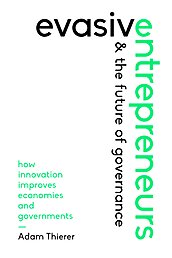Innovators of all stripes—such as Airbnb and Uber—are increasingly using new technological capabilities to circumvent traditional regulatory systems, or at least put pressure on public policymakers to reform laws and regulations that are outmoded, inefficient, or illogical. Disruptive innovators are emerging in other fields, too, using technologies as wide-ranging as 3D printers, drones, driverless cars, Bitcoin and blockchain, virtual reality, the “Internet of Things,” and more. Some of these innovators just love to tinker. Others want to change the world with new life-enriching products. And many more are just looking to earn a living and support their families. Regardless of why they are doing it, these evasive entrepreneurs— innovators who don’t always conform to social or legal norms—are changing the world and challenging their governments.
Beyond boosting economic growth and raising our living standards, evasive entrepreneurialism can play an important role in constraining unaccountable governmental activities that often fail to reflect common sense or the consent of the governed. In essence, evasive entrepreneurialism and technological civil disobedience are new checks and balances that help us rein in the excesses of the state, make government more transparent and accountable, and ensure that our civil rights and economic liberties are respected.
Evasive Entrepreneurs and the Future of Governance explores why evasive entrepreneurs are increasingly engaged in different forms of technological civil disobedience and also makes the case that we should accept—and often even embrace—a certain amount of that activity as a way to foster innovation, economic growth, and accountable government.

